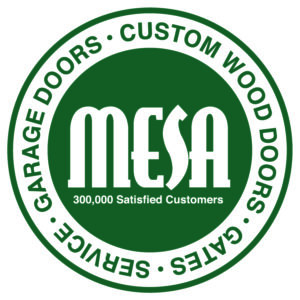Lubrication 101: The Best Products for Garage Door Maintenance
Do you have a sticky or squeaky garage door? It may need some lubrication. While some garage door maintenance is best left to professionals, garage door lubrication is typically a task you can do yourself. However, the experts at Mesa Garage Doors are available for garage door maintenance if you prefer to have a professional handle the job. Whether we’re performing an installation, repair, or routine maintenance and lubrication, we always adhere to California state safety standards.
Explore the best lubricant for garage doors, how to lubricate garage doors, and other garage door maintenance tips from the team at Mesa Garage Doors. We’re Southern California’s local go-to experts for upkeep, garage door replacements, and repairs of all kinds.
Why Garage Door Lubrication Is Essential for Long-Term Functionality
Garage door lubrication is one of the top five most important tips for maintaining your garage door properly, along with regular inspections, cleaning, servicing, and safety tests. Regular lubrication helps with:
- Reducing wear and tear on all moving parts.
- Saving you money on repairs.
- Preventing rust and corrosion.
- Garage door noise reduction.
- Extending the lifespan of the door.
Taking a few moments to lubricate your garage door’s moving parts keeps the system running smoothly, protects your property, and reduces the need for garage door repairs.
Types of Lubricants: Silicone vs. Lithium vs. WD-40
There are several types of lubricants available on the market, each with its pros and cons. Below are the most commonly used lubricants for residential DIY jobs and mechanical moving parts.
Silicone-Based Sprays
A silicone spray for garage doors is the ideal choice for lubricating specific components of your garage door. Silicone-based spray is a synthetic grease composed of silicone oil and a thickening agent. It’s safe for use on metal, rubber, and plastic surfaces, including electronic components and smaller garage door parts such as hinges and rollers. Silicone sprays are particularly effective in low-temperature and low-stress environments.
Lithium Grease
Lithium grease is a petroleum-based lubricant that performs best in areas where metal surfaces come into contact with each other. It’s suitable for heavy loads, withstanding extreme temperature changes, and resisting corrosion. Using lithium grease on your garage door rollers, hinges, and springs is effective due to their metal-to-metal contact points. However, it shouldn’t be applied to the tracks or any plastic parts.
WD-40 Degreaser
WD-40 isn’t a good option for garage door spring lubrication, hinge lubrication, or as a garage door roller lubricant. Oil-based, water-displacement products temporarily loosen jammed or stuck mechanical parts, but they dry to a sticky residue that attracts dust, grime, and debris. This causes jamming and other serious problems over time. WD-40 may also damage any nearby plastic casings or rubber components.
Where To Lubricate: Rollers, Hinges, Tracks, and Springs
Numerous moving parts make your garage door operate, and they all require regular lubrication to function properly.
Rollers
Focus on applying lubricant to the bearings within the rollers. This is especially important if they’re exposed to the elements. Nylon roller wheels do not require lubrication.
Hinges
Apply lubricant to the hinge pins, the hinge barrels, and where the hinge rotates and moves. Once a light coating is achieved, work the lubricant in by opening and closing the door a few times.
Tracks
Before working on garage door tracks, disengage the door from the opener for safety. Once it’s disconnected, silicone- or lithium-based lubrication can be applied where the rollers contact the track.
Springs
Spray lubricant onto the torsion springs directly, with a focus on the spring’s coils and the bearing plates located at the top of the door. Also, spray a light coating onto the pulleys and the torsion springs.
How Often Should You Lubricate Your Garage Door?
Wondering how often to lubricate your garage door? For optimal results, we recommend that Orange County residents apply lubrication to the critical moving areas of their garage doors at least once or twice a year, depending on the frequency of use and the age of the garage door. This simple action takes just a few minutes and could save you hundreds of dollars on future repairs.
Best Products for Garage Door Lubrication
The top-rated products for lubricating your garage doors are silicone-based lubricants and white lithium grease. These products have been developed to work seamlessly on moving parts, preventing corrosion and providing long-lasting functionality, even through Southern California’s heat waves.
Common Lubrication Mistakes To Avoid
It’s possible to address issues like a garage door squeaking and fix them yourself, but you’ll want to avoid these common DIY garage door lubrication errors:
- Not cleaning the area before lubricating: To start, you should wipe the parts you’re going to lubricate with a clean rag. Remove dirt, cobwebs, and other debris.
- Using degreasers or oil-based lubricants: Using the wrong product may cause more problems in the long run, such as sticking, excess dirt, and mechanical issues.
- Neglecting to remove excess lubricant: After applying a light coating, wipe away any excess lubricant. Otherwise, it can drip and attract dirt to the tracks, springs, or other moving parts.
Trust Mesa Garage Doors for Professional Garage Door Maintenance
Regular garage door opener maintenance is key for quiet and safe garage door operation. At Mesa Garage Doors, our experts provide professional maintenance and lubrication services to homeowners throughout Southern California.
Contact us today to schedule a service or visit our Anaheim showroom to explore our garage door selection. We offer free estimates on new doors and repairs, and we’re available to book your garage door maintenance appointment now.
Mr. Saunders serves as Mesa’s Vice President of Marketing, bringing with him a wealth of experience in strategic marketing and operations. In this role, Mr. Saunders is responsible for overseeing all marketing activities, utilizing a blend of traditional and digital strategies to enhance brand presence and profitability, managing a multi-million dollar marketing budget across various media platforms, and leading the continued implementation of CRM systems to streamline customer engagement and drive business growth.









